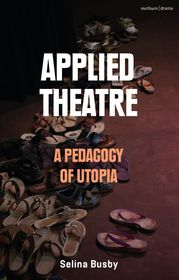
Rethinking Olympic Legacy
Series: Routledge Research in Sport, Culture and Society;
- Publisher's listprice GBP 43.99
-
21 016 Ft (20 015 Ft + 5% VAT)
The price is estimated because at the time of ordering we do not know what conversion rates will apply to HUF / product currency when the book arrives. In case HUF is weaker, the price increases slightly, in case HUF is stronger, the price goes lower slightly.
- Discount 20% (cc. 4 203 Ft off)
- Discounted price 16 813 Ft (16 012 Ft + 5% VAT)
Subcribe now and take benefit of a favourable price.
Subscribe
21 016 Ft

Availability
Estimated delivery time: In stock at the publisher, but not at Prospero's office. Delivery time approx. 3-5 weeks.
Not in stock at Prospero.
Why don't you give exact delivery time?
Delivery time is estimated on our previous experiences. We give estimations only, because we order from outside Hungary, and the delivery time mainly depends on how quickly the publisher supplies the book. Faster or slower deliveries both happen, but we do our best to supply as quickly as possible.
Product details:
- Edition number 1
- Publisher Routledge
- Date of Publication 6 December 2019
- ISBN 9780367894108
- Binding Paperback
- No. of pages215 pages
- Size 234x156 mm
- Weight 453 g
- Language English
- Illustrations 6 Illustrations, black & white; 6 Line drawings, black & white; 45 Tables, black & white 18
Categories
Short description:
This book shifts the focus from legacy as a retrospective concept concerned with what has been left behind after the Olympic Games to a prospective one, interested in the actions and interactions stimulated by them. It challenges our current understanding of legacy and reveals the for social change.
MoreLong description:
How do Olympic legacies come about? This book offers an alternative approach to the study of Olympic and mega-sport event legacy, challenging how legacy is conceptualised and practised. It shifts the focus from legacy as a retrospective concept concerned with what has been left behind after the Games, to a prospective one interested in actions and interactions stimulated by the Games.
The book argues that creating Olympic legacy is a continuing four-stage process involving ‘investing’ (the accumulated common Olympic cultural capital), ‘interpelling’ (forming a trusteeship relationship where one party undertakes to change the capacity of another), ‘developing’ (ensuring participation in interactions and resource development) and ‘codifying’ (documenting, sharing and remembering legacies so they become cultural capital). It presents a developmental approach to the Olympics which involves vision, trustees and trusteeship and is concerned with capacity building at individual, organisational and societal levels. Thinking of Olympic legacy as capacity building allows seeing the goal of legacy as an embodiment of the aspirations of the Olympic Movement and the Games to introduce radical change in society by transforming its structure.
Rethinking Olympic Legacy is essential reading for all students and scholars within an interest in the Olympics, as well as for administrators, policymakers and planners involved with mega-sport events.
MoreTable of Contents:
List of Tables and Figures
Preface: The Whole Book in 500 Words
Acknowledgements
1. Untangling the Link Between the Olympics and Legacy: An Introduction
2. Olympism, Contentious Politics and Social Change
3. A Resource Perspective on the Olympics
4. Leveraging Olympic Resources
5. Olympism in Action: A Capacity Building Perspective
6. National Sport Organisations' Leveraging of the Olympics for Capacity Building
7. Host Country’s Higher Education Sector and the Olympics: Interactions, Resources and Capacity Development
8. Olympic Interactions, Resource Leveraging and Capacity Building in Context: The Cases of the British Paralympic Association, British Cycling and the Russian Figure Skating Federation [with Nikolay Peshin]
9. Why Rethink Olympic Legacy? Conclusion
Index
More







